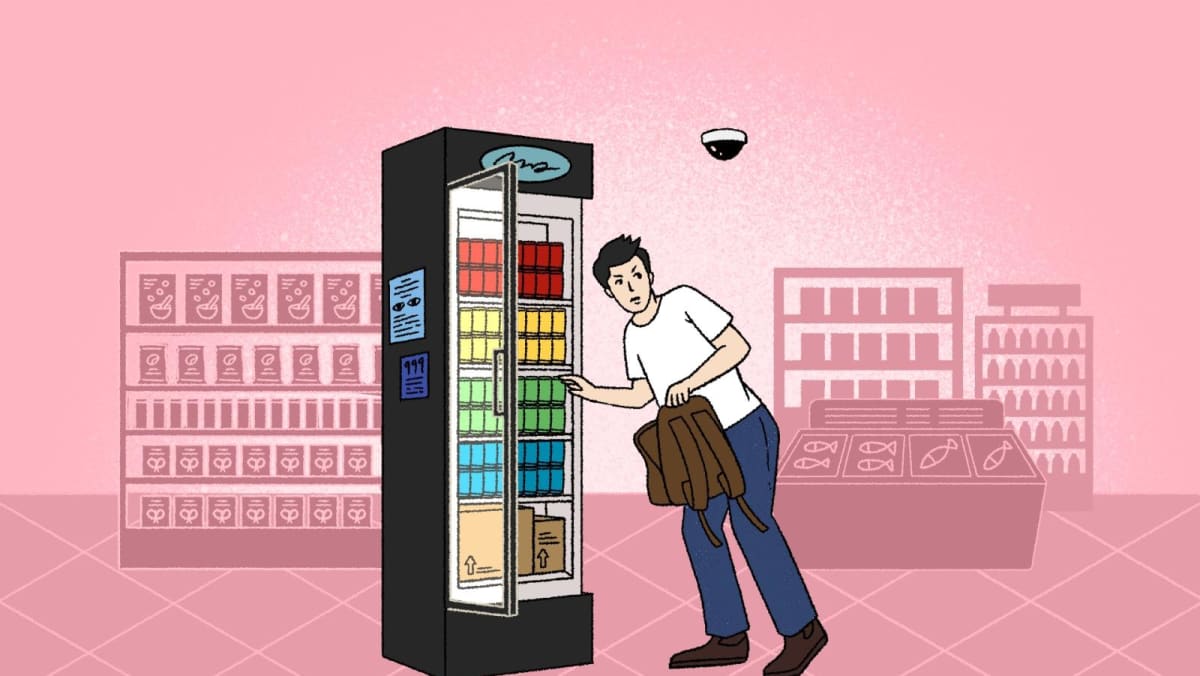2. MANPOWER AND COST CONSTRAINTS
In Singapore, Mr Khairul noted that with the roll-out of the Progressive Wage Model – a wage structure designed to lift lower-wage workers’ salaries – many companies including grocers are facing higher operating expenses.
To mitigate these costs, grocers often turn to self-checkout systems, which help reduce manpower expenses.
At the same time, they are hesitant about investing in more advanced technology to enhance security.
“One of the major challenges with traditional CCTV management is the sheer volume of footage. Someone needs to sift through 24 hours of footage to spot a suspect,” Mr Khairul said.
“Analytics technology can help reduce the workload by 70 per cent, but this implementation comes with added costs and grocers are mostly unwilling to invest in it.”
Mdm Hoe, the store leader in Ang Mo Kio, also expressed concern about manpower constraints. She said that most of the time, only two people including herself are manning the store.
“There’s a lot of pressure. With just two of us working, it’s stressful when one goes on a break because one person can’t do everything.
“If customers ask questions, it becomes difficult to keep an eye on everything that’s going on in the shop,” she added.
3. INDIVIDUAL MOTIVATIONS AND AFFLICTIONS
As shoplifting cases rise, one might wonder whether the increasing cost of living is a contributing factor.
However, the answer is not clear-cut, with shopkeepers telling CNA TODAY that they generally do not see rising costs as the main cause.
They often observe that the items being stolen are non-essential goods. They also encounter people who appear to steal “out of habit”.
Based on interviews with criminal lawyers and forensic psychologists, there are three common reasons people steal: They steal because they need the items, they want to seek thrills or they have mental health conditions.
Associate Professor Ferlin Jayatissa from the Singapore University of Social Sciences said that to better understand the impact of the cost of living on shop theft cases, it is crucial to consider not just the number of cases but also the items being stolen.
“Theft of basic necessities from supermarkets or department stores could suggest a link to financial hardship. If people are stealing potato chips or snacks, it may be linked to thrill-seeking rather than necessity.”
Mr Raphael Louis, the managing director of law firm Ray Louis Corporation, said that it is generally difficult to identify specific demographic or socioeconomic patterns among shoplifters.
From his experience, they come from a diverse range of backgrounds including teenagers, middle-aged adults and seniors, as well as people from middle-income to affluent households.
“Some steal items like wine, makeup, perfume or clothing, even though they can afford to buy them. For instance, I once represented a female working professional caught stealing bananas from a supermarket,” he said.
“Sometimes, you can make a logical connection. Perhaps they’re facing financial difficulties or have a condition like kleptomania or depression. Other times, there’s no (clear explanation) at all.”
Kleptomania is an impulse control disorder where a person is unable to resist repeated urges to steal things that are usually not needed.
Young people tend to fall into the category of thrill-seekers, but there are also other reasons that drive them to pilfer.
Experts and social workers told CNA TODAY that younger people are often tempted to steal due to peer pressure and financial hardships at home, leading to insufficient pocket money for the things they desire.
Mr TM Narasimman, executive director of Impart, a social service organisation that supports youth facing adversities, said that the young today have an increasing list of items they feel they need such as phone chargers or gaming devices, which can be costly.
“Emotional deprivation plays a role as well, such as parents not spending enough time with their children or neglectful situations. This often leads kids to seek things illegitimately,” he added.
“When a young child commits a crime, it’s usually a symptom, not the root cause. Their behaviour is often a reflection of deeper needs they’re unable to communicate properly.”
Ms June Fong, senior forensic psychologist at Promises Healthcare, explained that finances alone are not a reliable indicator of who is more prone to shoplifting. Many people with limited means do not resort to shoplifting despite having the same strong desire for certain goods.
“In my experience, one of the key factors affecting young shoplifters is an under-developed sense of what we call consequential thinking,” she said.
Promises Healthcare is a multidisciplinary mental health clinic that offers psychiatric, psychological and physical well-being services to children and adults.
“The thought of taking something for ‘free’ and getting away with it has probably crossed most people’s minds. But children and young people are less able to resist these urges through logical reasoning and by weighing the consequences of their actions,” Ms Fong added.
Lawyer Josephus Tan, managing director of Invictus Law Corporation, said that he has encountered clients from all three categories, but more do it due to mental health reasons such as kleptomania or other mental afflictions.
He added that most of these offenders are adults and can be either male or female.
“For some, a tragic event like a divorce or retrenchment may trigger the behaviour. Although they may have the means to pay, their mental struggles might lead them to leave the shop without paying.
“They may not pay attention to what they are taking or it could simply be an impulsive act.”
Dr Jacob Rajesh, senior consultant psychiatrist at Promises Healthcare, said studies have shown that some mental health disorders are associated with an increased risk of shoplifting.
The prevalence of mental health issues is notably higher among repeat offenders as well, compared to non-shoplifters and first-time offenders, he noted.
Some examples include kleptomania, depression, bipolar disorder, dementia and intellectual disability.
“People with antisocial personality disorder may also commit shoplifting for the thrill of doing so, because they lack guilt and remorse and break laws,” Dr Rajesh added.
